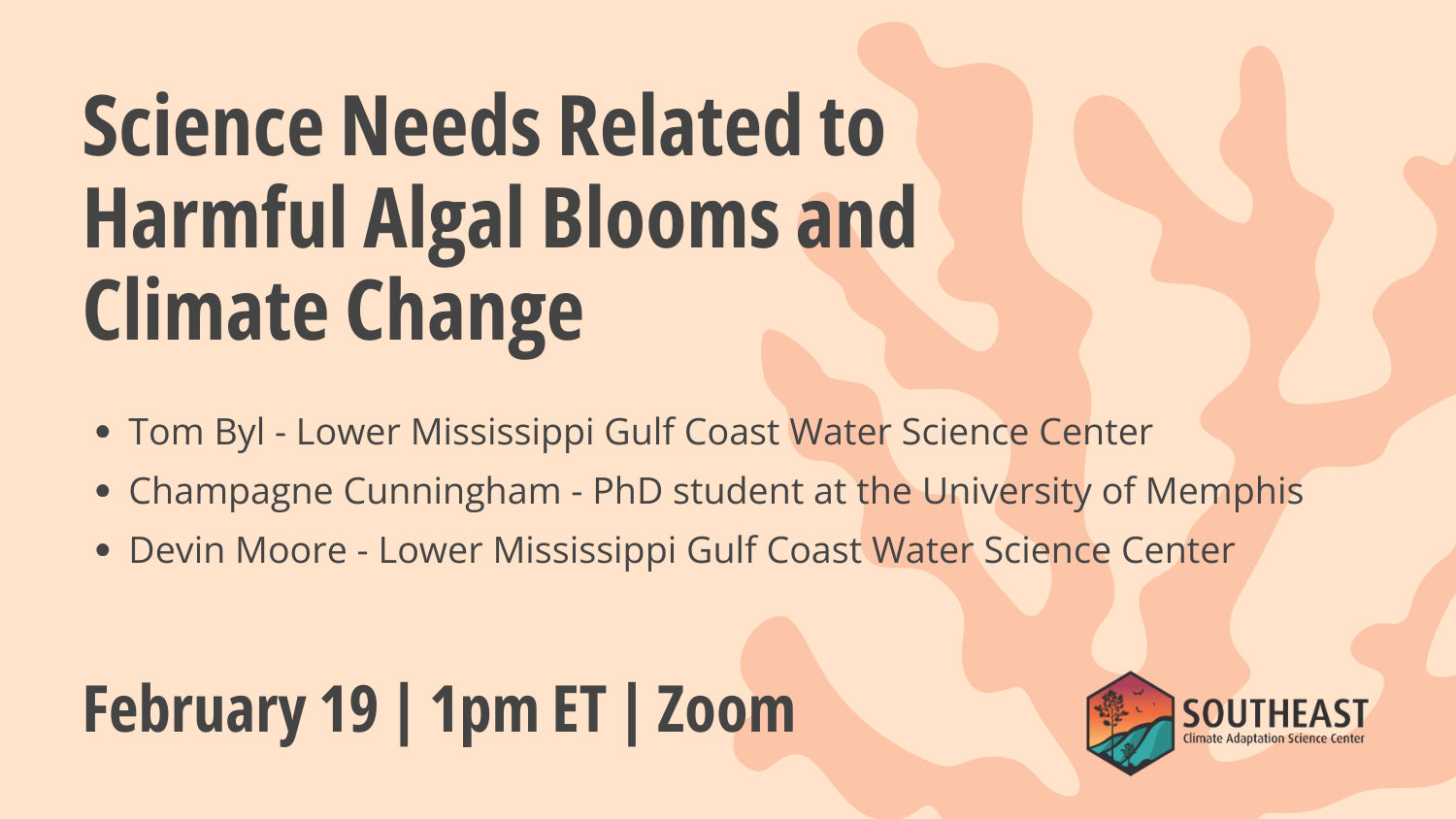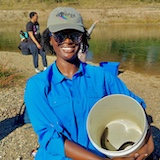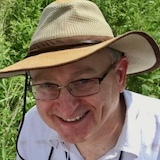Recording: Science Needs Related to Harmful Algal Blooms and Climate Change

Wednesday, February 19 at 1pm ET
via Zoom
Abstract:
It is well known that nutrients and warm waters stimulate algae growth, but it is not clear how the many parameters affected by climate change will influence the production of toxins by Harmful Algal Blooms (HABs). Storm occurrence, droughts, temperature, dissolved metals, erosion of soils, increasing length of growing season, discharge, and hydroperiod all play a role in algae growth and toxin production. Climate and hydrologic models address many of the physical and environmental parameters that influence HABs, but no climate models directly address HABs themselves.
This project compiles information from the literature pertaining to HABs and the need for models that forecast the probability of HABS.
Speakers:
Champagne Cunningham – PhD student at the University of Memphis
Champagne Cunningham is a PhD student at the University of Memphis working with Rachel Diner. She is currently researching microbiomes of bivalves and the potential effects of harmful algal blooms (HABs) on their microbiomes. She completed her B.A. degree at Loyola University New Orleans in Environmental Studies and her M.S. degree at Tennessee State University in Environmental Science. Champagne has studied imperiled darters, invasive macrophytes, and harmful algal blooms. Her M.S. research confirmed the preservation of cyanotoxins in fossilized mollusks of the Late Cretaceous Period. She is heavily involved in the Society of Freshwater Science and works to create a welcoming and inclusive environment for all.

During her time with the USGS Lower Mississippi-Gulf Water Science Center, Champagne worked as social media manager. She increased awareness of USGS research and made more USGS science accessible to the public. Champagne also worked as a physical scientist examining the role environmental stressors have on HABs and as a part of a long-term river water quality monitoring project team.
Devin Moore – Lower Mississippi Gulf Coast Water Science Center
From Grand Rapids, Michigan, Devin Moore was raised with a passion for the environment through k-12 environmental science curriculum. He went to Yale University for undergrad, where he played on the Yale varsity football team. While there, he found a passion for environmental justice, and this came forth in my double major: Environmental studies and African American studies, with a concentration in Environmental Justice. While there, he wrote his undergraduate thesis on how the emergency management system in Michigan has been used to exact environmental injustices in underrepresented communities. He aspires to work with environmental law and policy.

After graduating into COVID in 2020 he determined that he wanted to pursue an environmental science degree to learn more about the field. He enrolled in the environmental science M.S. program at Tennessee State University in Fall 2022 , working in Dr. Tom Byl’s lab, studying harmful algal blooms in Nashville, TN’s urban watersheds. He is currently writing his graduate thesis this spring on that same subject, looking at microcystin levels in the water as well as tree cover and impervious surfaces in the surrounding area (using GIS). While at TSU, he has worked toward a GIS certification and started working as a student contractor with US Geological Survey, where he is involved in water quality and GIS projects.
Tom Byl – Lower Mississippi Gulf Coast Water Science Center
Tom Byl, Ph.D. is a U. S. Geological Survey Biologist and is stationed as an environmental science faculty member at Tennessee State University for 29 years through an arrangement with the Dept of Interior and TSU College of Agriculture. Tom’s lab is involved in water resources and environmental equity projects. Tom and his students are looking at factors that stimulate HABs, better ways to monitor HABs and ways to remediate them. Their research combines the disciplines of hydrology, biology, chemistry and engineering. Tom has been a research advisor to more than 50 Masters students and 200 undergraduate students in engineering, biology, agriculture and environmental sciences over the past 29 years.

Tom has established formal collaborations between TSU the USGS and the geoscience departments at Vanderbilt, Univ. of Tennessee, Knoxville, and UT Martin to increase diversity in the earth sciences. Dr. Byl is an active member of the national and regional Geological Society of America (GSA), American Water Resources Association (AWRA), National Speleological Society (NSS), Tennessee Academy of Sciences, and the Tennessee HAB Working Group.
- Categories:
